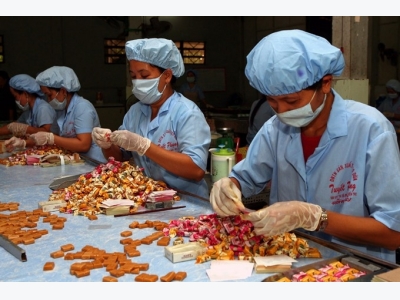Coconut shortage hits Bến Tre

A Tuyết Phụng Company coconut candy processing line in Bến Tre Province’s Mỏ Cày Nam District. — VNA/VNS Photo Huy Hùng
BẾN TRE — Businesses making coconut-based products in the Cửu Long (Mekong) Delta province of Bến Tre are facing a raw material shortage due to last year’s drought and saltwater intrusion from the sea into rivers.
Nguyễn Bảo Trí, deputy director of the Lương Quới Coconut Processing Company, said: “The supply in the province is not enough to meet the demand of the market and processing companies.
“Companies have to import dried coconut from other places.”
Companies have to compete with each other to buy raw materials for their production, he added.
Due to the shortage, prices have surged to around VNĐ110,000 (nearly US$5) for a dozen coconuts, nearly double the rate at this time last year.
Some coconut groves have also been plagued by insects this year, local farmers said.
According to the province’s Department of Industry and Trade, Bến Tre has nearly 2,000 companies processing coconut-based products to supply both the domestic and export markets.
When operating at full capacity, they need around 1.1 billion dried coconuts a year.
The shortage is a big challenge now, the department said.
The Bến Tre Province People’s Committee’s deputy chairman Nguyễn Hữu Lập told the Sài Gòn Giải Phóng (the Liberated Sài Gòn) newspaper that most farmers grow coconuts on small pieces of land, and face all attendant problems.
Provinccial Party Secretary Võ Thành Hạo said to resolve their problems and ensure steady production farmers need to change their production methods.
The main need at the moment is to work together by setting up co-operation models and co-operatives and apply modern technologies to improve quality and prevent insects, he said.
Co-operation between farmers, companies, managers and scientists is essential and needs to be strengthened, he said.
Companies should actively connect with farmers and help them use technology to increase quality and yields, he added.
Related news
 Vietnamese rice labeled with foreign names sells better than domestic brands
Vietnamese rice labeled with foreign names sells better than domestic brands Vietnamese choose foreign rice not because the latter is better, but because Vietnamese enterprises don’t know how to build their brands, experts say.
 Thua Thien-Hue focuses on agricultural restructuring
Thua Thien-Hue focuses on agricultural restructuring The central province of Thua Thien-Hue is focusing on 12 priority projects worth nearly 1,196 billion VND (52 million USD) to speed up agricultural
 Australia seeks hi-tech agriculture link with Mekong Delta
Australia seeks hi-tech agriculture link with Mekong Delta Australia has the highest proportion of self-supplier of farm produce in the world. Averagely, an Australian farmer could produce farm produce for 190 people.